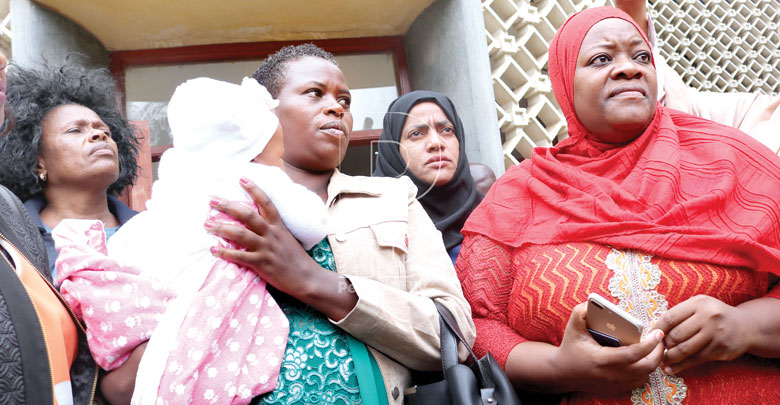5-month-old baby brings Parliament to a standstill
By Mercy Mwai, August 8, 2019Parliamentary business was yesterday temporarily disrupted when Kwale Woman Rep Zulekha Hassan entered the chambers with her five-month-old baby.
Trouble started when the MP, who said she “had an emergency” and had to carry her baby to work, walked in as Leader of Majority Aden Duale was moving a motion on the Kenya-Somalia maritime border dispute. Duale temporarily stopped his presentation to allow presiding Speaker Chris Omulele (Luanda MP) to intervene.
He asked the Speaker to ensure Hassan’s baby was taken out of the House and demand a report from the Sergeant-at-Arms how the baby ended up in the House.
Never happened
“Mr Speaker, this House has a stranger, and it has never happened since 1963. We cannot have 349 and a half Members of Parliament. This is unprecedented; I have never seen it. This is an abuse [of office]. That member must be cited and she has ashamed the people of Kwale,” he said.
Terming the MP’s action as unprecedented, the Speaker said he had no choice but to ask Hassan to leave because House Standing Orders do not allow members to bring along babies.
“I, as the Speaker today, determine the membership of the National Assembly at 349. In as much as Hon Zulekha Hassan wants to take care of her child, this is not the place for it. And I, therefore, direct that she immediately be withdrawn, and she may return to the chamber after she withdraws the child,” he said.
He added that the Parliamentary Service Commission (PSC) had provided sufficient facilities for lactating mothers within the precincts of Parliament, but not within the chamber. But some members refuted this and urged Hassan to stay put, causing a standoff in the chambers.
The Speaker called the Sergeant-at-Arms to evict Hassan, who by then was being shielded by her female colleagues. Alego Usonga MP Sam Atandi, was also ejected from the proceedings for disorderly conduct after he encouraged the nursing legislator to stay put.
Addressing journalists later, Hassan said Parliament was yet to set up a family room despite agreeing to do so in 2013.
“I have tried really hard not to come with the baby, but today I had an emergency; what was I supposed to do? If Parliament had a nursery or a crèche, I would put my baby there,” she said.
Yet to happen
MPs in 2013 passed a motion directing the PSC to set aside a room within Parliament for breastfeeding mothers, but this is yet to happen.
“Now, as we ask for more women to come to Parliament, you need to provide a family-friendly atmosphere,” the MP added.
Female legislators, who stormed out in solidarity with Hassan, threatened to carry their babies to the House if the PSC fails to erect crèches for nursing mothers.
Ijara MP Sophia Abdi Noor said it was unfortunate that such an incident could happen in Parliament where laws are made and wondered how working mothers elsewhere in the country were coping.
“This child has a right, if they don’t establish a breastfeeding room then we will urge all women with breastfeeding children to come with their children in the chambers to send a message,” she said.
Kitui South MP Rachel Nyamai questioned why the PSC had failed to give priority to young mothers by setting up a crèche.
“This child has a right to be with the mother and we don’t understand why she is being sent away,” she said.
Laikipia North legislator Sarah Korere accused the PSC of ignoring the plight of nursing mothers saying exclusive breastfeeding for the first six months is important.
“Lawmakers must lead by example and today we are saying enough is enough,” Korere said.
The drama started a debate on social media with some Kenyans praising the MP, pointing to other countries that allow babies in Parliament.
Other’s, however, were less accommodating accusing the legislator of being an attention seeker.
